Background
Future Farming Needs to Regenerate Soil and Soil Health
Healthy soils are crucial for the provision of food. Soil degradation is a serious threat to long-term agricultural productivity. There is a need to actively strive to regenerate soil and soil health through soil management practices that are beneficial for soil organic matter, soil organisms, and soil biodiversity.
Nutrients in Human Excreta Need to be Recycled to Agriculture
Sustaining agricultural productivity requires that nutrients taken up by crops are replenished. Global food production largely relies on nutrients mined from finite reserves. Recycling nutrients in human excreta to agriculture can make important contributions to more circular nutrient flows and improved food security.
Human Excreta Need to be Managed for Nutrient Cycling and Soil Regeneration
A broad variety of technological options have become available to recover nutrients in human excreta. Soil regeneration and long-term soil health, however, have generally not been a primary objective in these developments. There is a need to identify opportunities and best practices to better align the management of human excreta with the needs of long-term soil fertility and health.
Purpose
Leverage Knowledge Base and Debates Surrounding Nutrient Cycling and Soil Regeneration
This research asked: how can the recycling of nutrients in human excreta to agriculture best support farming systems and practices that regenerate rather than impoverish soil? Is a focus on phosphorus and possibly nitrogen and potassium sufficient, or do we also need to address micronutrients and organic matter in order to enable long-term soil fertility and health? The aim is to help key actors shaping the future management of human excreta to better leverage the knowledge base and debates surrounding both nutrient recycling and soil regeneration.
Approach
Exposing Preferences and Assumptions Associated with Different Options and Assessment Tools
This research did not attempt to provide a single definitive answer or best solution. Rather, it aimed to expose the often implicit preferences and assumptions associated with different options to recycle nutrients and organic matter in human excreta to agriculture and regenerate soil, as well as with different assessment tools used to find the best option in a given context. Different perspectives and aspects were explored using a mixed methods approach guided by a range of questions at the intersection between nutrient recycling and soil regeneration.
Outcomes
Future Infrastructure for Human Excreta Management Supports Long-Term Soil Health
Bringing forth different perspectives should allow for a more nuanced understanding of potential leverage points, discrepancies, and blind spots in the knowledge base and debates surrounding nutrient recycling and soil regeneration. Hopefully, this will promote infrastructure that is designed to facilitate both nutrient recycling and soil regeneration, assessment tools that adequately capture aspects of both nutrient recycling and soil regeneration, and an awareness that this is important.
Associated Papers
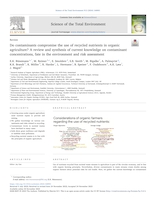
Do contaminants compromise the use of recycled nutrients in organic agriculture? A review and synthesis of current knowledge on contaminant concentrations, fate in the environment and risk assessment
DOI: 10.1016/j.scitotenv.2023.168901
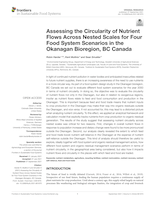
Assessing the circularity of nutrient flows across nested scales for four food system scenarios in the Okanagan bioregion, BC Canada
DOI: 10.3389/fsufs.2021.661870
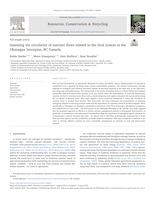
Assessing the circularity of nutrient flows related to the food system in the Okanagan bioregion, BC Canada
DOI: 10.1016/j.resconrec.2021.105842
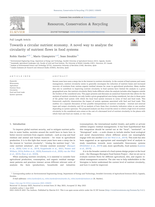
Towards a circular nutrient economy. A novel way to analyze the circularity of nutrient flows in food systems
DOI: 10.1016/j.resconrec.2021.105693
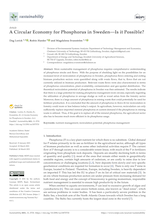
A Circular Economy for Phosphorus in Sweden—Is It Possible?
DOI: 10.3390/su13073733
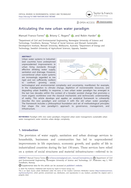
Articulating the new urban water paradigm
DOI: 10.1080/10643389.2020.1803686
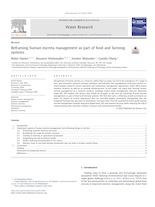
Reframing human excreta management as part of food and farming systems
DOI: 10.1016/j.watres.2020.115601
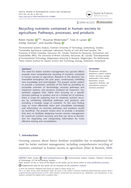
Recycling nutrients contained in human excreta to agriculture: Pathways, processes, and products
DOI: 10.1080/10643389.2018.1558889
Associated Reports
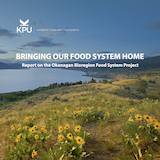
BRINGING OUR FOOD SYSTEM HOME: Report on the Okanagan Bioregion Food System Project
Download here
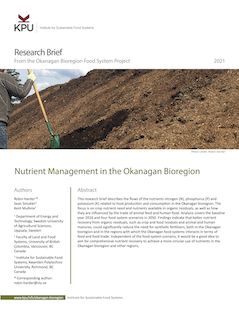
Nutrient Management in the Okanagan Bioregion
Download here
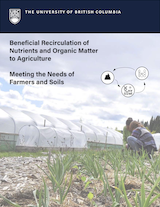
Beneficial Recirculation of Nutrients and Organic Matter to Agriculture: Meeting the Needs of Farmers and Soils
Download here